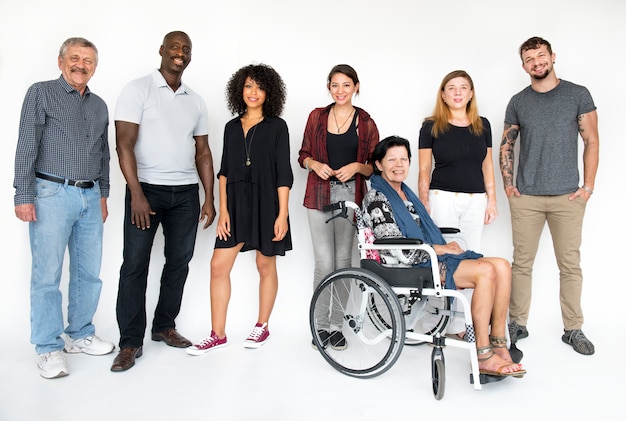US Government Programs for Individuals with Disabilities: Updates & Eligibility

US Government programs for individuals with disabilities offer crucial support through various initiatives; recent updates focus on expanding eligibility criteria and enhancing accessibility to ensure comprehensive assistance.
Navigating the landscape of US Government programs for individuals with disabilities can be complex, but understanding the recent updates and eligibility requirements is crucial for accessing the support you or your loved ones deserve.
Understanding Federal Disability Programs
The US government provides a range of programs designed to support individuals with disabilities. These programs aim to ensure equal opportunities and access to essential services. Understanding the core federal programs is the first step toward accessing available assistance.
Social Security Disability Insurance (SSDI)
SSDI provides benefits to individuals who have worked and paid Social Security taxes. To qualify, you must have a disability that prevents you from engaging in substantial gainful activity (SGA).
Supplemental Security Income (SSI)
SSI is a needs-based program for individuals with disabilities who have limited income and resources. Unlike SSDI, SSI doesn’t require a work history.
- Application Process: Both SSDI and SSI require a detailed application process, including medical documentation.
- Eligibility Criteria: SSDI eligibility is based on work history and medical condition, while SSI is based on financial need and disability.
- Benefit Amounts: Benefit amounts vary depending on individual circumstances and program guidelines.

These programs form the cornerstone of federal support, offering both financial assistance and access to healthcare for eligible individuals with disabilities. Staying informed about these programs ensures that those who need help can receive it.
Recent Updates to Disability Programs
Several updates have been made to US Government programs for individuals with disabilities in recent years, impacting eligibility and accessibility. These changes reflect ongoing efforts to improve support systems and address evolving needs.
Changes in Eligibility Criteria
The Social Security Administration (SSA) periodically updates its eligibility criteria to reflect current medical standards and labor market conditions. Recent changes may include revised listings of impairments and updated guidelines for evaluating disability claims.
Expansion of Services
Many programs have expanded their services to include additional support for individuals with disabilities. This may involve increased access to vocational training, assistive technology, and mental health services.
Staying abreast of these changes is essential for individuals with disabilities and their advocates. It ensures that eligible individuals can access the full range of benefits and services available to them.
Eligibility Requirements for Key Programs
Each government program has specific eligibility requirements that individuals must meet to qualify for benefits and services. Understanding these requirements is crucial for navigating the application process and accessing needed support.
Medical Requirements
Most disability programs require applicants to provide medical documentation of their disability. This may include doctor’s reports, test results, and other relevant medical records. The documentation must demonstrate that the disability significantly limits the individual’s ability to perform basic activities.
Income and Asset Limits
Some programs, such as SSI, have income and asset limits that applicants must meet. These limits are designed to ensure that assistance is targeted to individuals with the greatest financial need. Exceeding these limits may disqualify an applicant from receiving benefits.
- Documentation: Ensure all medical records and financial statements are accurate and up-to-date.
- Expert Assistance: Consider seeking assistance from disability advocates or legal professionals.
- Ongoing Compliance: Stay informed about program requirements and ensure ongoing compliance to maintain eligibility.
Meeting eligibility requirements can be challenging, but careful preparation and a clear understanding of program guidelines can increase the likelihood of success.

Navigating the Application Process
Applying for US Government programs for individuals with disabilities can be complex, but understanding the process and gathering the necessary documentation can make it more manageable. A well-prepared application is key to a successful outcome.
Gathering Necessary Documentation
Collect all relevant medical records, financial statements, and other documentation that supports your claim. Ensure that all documents are accurate, complete, and organized.
Completing the Application
Fill out the application forms carefully and thoroughly. Provide detailed information about your disability, work history, and financial situation. Seek assistance from disability advocates or legal professionals if needed.
Navigating the application process requires patience and persistence. Stay organized, seek assistance when needed, and follow up on your application to ensure it is being processed in a timely manner.
Resources and Support Services
Numerous resources and support services are available to assist individuals with disabilities and their families. These resources can provide valuable information, guidance, and practical assistance throughout the application process and beyond.
Disability Advocacy Organizations
Disability advocacy organizations offer a range of services, including information and referral, legal assistance, and advocacy support. These organizations can help individuals navigate the complexities of disability programs and access needed services.
Vocational Rehabilitation Services
Vocational rehabilitation services provide training, counseling, and job placement assistance to individuals with disabilities. These services can help individuals prepare for and obtain employment, promoting independence and self-sufficiency.
- Information and Referral: Connect with local disability organizations for information and guidance.
- Legal Assistance: Seek legal advice from attorneys specializing in disability law.
- Vocational Training: Explore vocational rehabilitation services to enhance employment prospects.
Accessing available resources and support services can significantly improve the outcomes for individuals with disabilities, promoting independence, self-sufficiency, and overall well-being.
Staying Informed About Program Changes
Keeping up-to-date with the latest changes to US Government programs for individuals with disabilities is essential for accessing the benefits and services you are entitled to. Staying informed ensures that you can take advantage of new opportunities and avoid potential pitfalls.
Regularly Check Official Websites
Visit the websites of the Social Security Administration (SSA) and other relevant government agencies for the latest news, updates, and program guidelines. These websites provide comprehensive information about eligibility requirements, application procedures, and available services.
Subscribe to Newsletters and Alerts
Sign up for newsletters and email alerts from disability advocacy organizations and government agencies. These resources provide timely updates about program changes, policy developments, and upcoming events.
Staying informed requires ongoing effort, but it is essential for ensuring that individuals with disabilities can access the support they need to thrive. Make it a priority to regularly check official websites, subscribe to newsletters, and attend informational events.
| Key topic | Brief description |
|---|---|
| ℹ️ SSDI Program | It provides financial support to those who are unable to work due to disability. |
| 📝 Eligibility updates | Updates take place periodically, reflecting medical and labor advancements. |
| 🧑⚖️ Apply for program | Gather comprehensive documentation, completing detailed applications. |
▼
SSDI provides financial benefits to individuals who have worked and paid Social Security taxes but are no longer able to work due to a disability. Eligibility is based on work history and medical condition.
▼
Eligibility typically requires medical documentation of a disability that prevents substantial gainful activity. Some programs, like SSI, also have income and asset limits.
▼
Regularly check the Social Security Administration website, subscribe to disability newsletters, and follow advocacy organizations to stay informed about recent updates.
▼
Disability advocacy organizations, vocational rehabilitation services, and legal aid organizations can provide assistance with the application process and help navigate eligibility requirements.
▼
If your claim is denied, you have the right to appeal the decision. Seek assistance from a disability advocate or attorney to help you navigate the appeals process and gather additional evidence.
[Título da seção FAQ em en-US]
Conclusion
Understanding and navigating US Government programs for individuals with disabilities requires diligence and awareness. By staying informed about eligibility requirements, recent updates, and available resources, individuals with disabilities can access the support they need to lead fulfilling and independent lives. These programs play a critical role in ensuring equal opportunities and promoting the well-being of individuals with disabilities across the nation.





